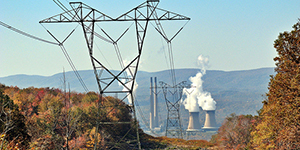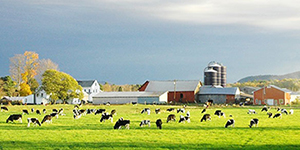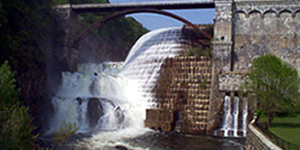
The Northeast Regional Earth System Model
Strategic Issues
NE-RESM researchers have identified four interdependent strategic planning foci for which they will devleop future 2013-2100 scenario experiments, in partnership with regional stakeholders. These focus issues are:
Energy Security and Climate Change Mitigation. The portfolio of energy production, conversion and use technologies that will be adopted over the next few years will significantly impact regional ecosystems and the role of the Northeast in contributing to future greenhouse gas emissions. At the same time, climate change induced changes in heating and cooling requirements may significantly alter regional energy demand. Climate change impacts on water availability may also affect the performance of thermoelectric power plants and future deployment mix in the region (including hydroelectric and biofuels), potentially jeopardizing the ability to meet the energy demands of the region and its increasing population.
Food Security and Agriculture. There has been a great deal of recent interest in the development of a regional food system for the 21st Century Northeast. However, farmers in the region will face increasing uncertainty an risk over the course of the century due to climate change, competition for land with continued suburbanization and resource constraints such as from high-quality water. While changing climate conditions may allow farmers to experiment with new crops, many crops traditionally grown in the area may become unsustainable without costly adaptation measures. Furthermore, potentially unanticipated impacts arising from increased erosion, agrochemicals leaching into water supplies or conflict with forest and wetland conservation initiatives may counter the otherwise positive benefits of a return to agriculture in the Northeast.
Water Quality Management. Recent analyses have identified a gap between future water infrastructure investment needs and projected levels of funding throughout the nation. This issue is particularly urgent in the Northeast, where hundreds of billions of dollars in the required drinking water and wastewater treatment facilities – and dwindling state revolving funds on which such infrastructure relies – are a looming crisis. Restoration of ecosystems that provide for natural water regulation/filtration and the utilization of ‘green’ infrastructure may provide an important means to fill this gap.
Land Use Management and Conservation of Open Space. Open spaces such as forests wetlands and pastureland provide vital ecosystem services but, in the Northeast Region, are increasingly threatened by suburban development and the construction of roads, transmission lines and other infrastructure. Current conservation initiatives, zoning policies and other land management decisions made in the next few years will play a critical role in the preservation of the region’s open spaces and the services they provide. The reality of financial incentives and regional economics of preservation also come into play, as recently demonstrated by increased pressure to relieve land protections on watersheds serving New York City and Northern New Jersey.

Pennsylvania coal plant (image courtesy of Ed Whitaker).

Miller Dairy (image courtesy of Northeast Organic Dairy Producers Alliance).

New Croton Reservoir, Croton-on-Hudson, New York (image courtesy of USGS).

Weiser State Forest, Pennsylvania (image courtesy of Nicholas Tonelli).

